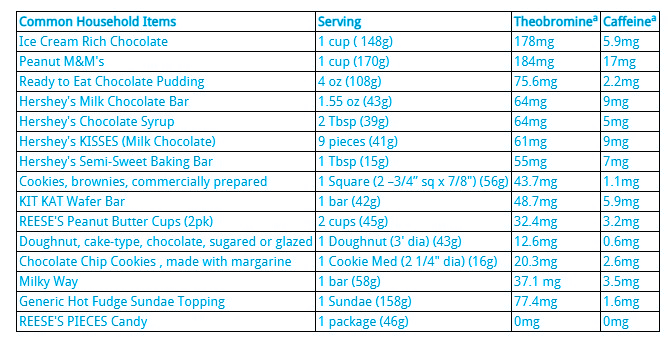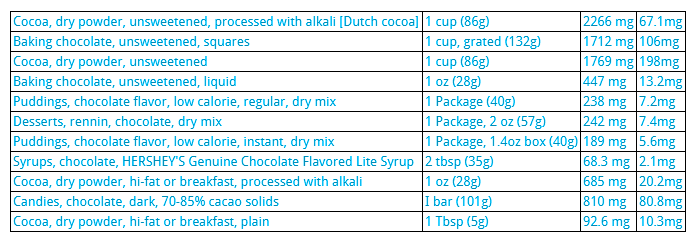My dog ate chocolate, what to do?
If you have reason to to believe that your dog consumed chocolate, reach out to your vet immediately and/or call the Pet Poison Helpline (855-213-6680) for advice. Seriously, if you’re in this situation don’t beat around the bush, do it now!
Depending on the size of your dog, as well as the type and amount of chocolate they ate, they may advise to simply monitor your dog for the clinical signs listed below and reach out again or perhaps bring them in should his/her condition worsen. (It’s probably best to take small dogs quickly to the vet just to be safe).
Treating a dog that ate chocolate
Bringing the dog to the vets office within 2 hours of ingesting the chocolate may result in them inducing your dog to vomit and giving your dog a few doses of activated charcoal; which works to decontaminate by carrying the undesirable toxins out of your dogs body in a timely manner, without them being absorbed by your dogs bloodstream.
In other, more acute cases, a veterinarian may intervene to take care of your dogs chocolate poisoning in a more serious manner; by proceeding with supplemental treatments to remedy the effects, such as:
- excretion by way of IV fluids
- calming the pet with sedatives
- heart meds to bring down the heart rate and blood pressure
- anti-convulsants for seizures
- diarrhea and stomach discomfort antacids (such as Pepcid)
- a urinary catheter or frequent walks may be required to keep the bladder empty.
Note: Does your dog suffers from seizures? If so, they may keep them at the vet clinic for additional overnight monitoring. (But, at home by you as well).
Chocolate toxicity in dogs

The darker the chocolate, the greater the threat.
In short, chocolate has chemicals that can do a number on your dogs metabolic processes. Though there is no general “safe” amount when it comes to dogs, the amount of these unfriendly-to-doggo chemicals varies between chocolate products. On top of that, the sensitivity to the chemical can vary from dog to dog, as each dog is unique, so some are more sensitive to it than others.
Which is probably why you may have seen a dog eat chocolate and not exhibit any serious distress thereafter; while in other’s the reaction is swift. Go figure, right?!
Why chocolate is toxic to dogs
Ok, let’s get a little technical, shall we?
Chocolate is toxic to your dog because it contains stimulants called methylxanthines. Now, jumping back to the English languages, more specifically chocolate contains caffeine and theobromine. Two big no-no’s for your dog.
Why are these bad for your dog? Because they can adversely affect your dogs metabolic processes, pancreatitis, the heart, and even the central nervous system. To put it pretty bluntly, if your dog consumes enough chocolate, they can die!
How much chocolate is toxic to dogs?
As you can see from the chart below, not all of the common chocolate-containing items sitting in your kitchen cabinets pose the same proportion of threat to ingestion. Knowing the type of chocolate your dog age, but also how much of it they chowed down, will help your veterinarian better assess the severity of the situation at hand.
Generally speaking: Consider that 1 mg is 3.52 ounces and 1 kg is 2.2 pounds.
- Mild symptoms: Around 20 mg of methylxanthines per kg of body weight.
- Cardiac symptoms: Around 40 mg to 50 mg per kilogram of body weight.
- Seizures: May occur at dosages greater than 60 mg per kg of body weight.[4]
Putting it in simpler terms, a mere ounce of milk chocolate per pound of body weight can ultimately be a potentially lethal dose for a dog. Due to just 1 oz of milk chocolate embodying 128.89 mg of theobromine and 13.33 mg of caffeine.
Chemical amounts in common household items

[a] Amounts of caffeine and theobromine will vary naturally due to growing conditions, cocoa bean sources, and variety. (Credit: PetMD)
Foods highest in theobromine

(Credit: PetMD)
Using the above information and the provided charts of chemical amounts in the most common of products, you’ll be better able to gauge your reaction should your dog get it’s paws on a chocolate bar. Now let’s see how to tell if they did.
What are the signs of chocolate poisoning?
As mentioned the level of toxicity that chocolate may cause to a dog ranges from a generally mild experience . . . to tragic fatality. Thus, knowing the common signs to watch out for can be a life saver, literally.
Each case is unique, but symptoms of chocolate poisoning in dogs usually appear 6 to 12 hours upon ingestion and can last up to 72 hours. Symptoms include:
- hyperactivity
- diarrhea
- vomiting
- collapse
- muscle tremors
- elevated body temperature (hypertension)
- elevated blood pressure (hyperthermia)
- abnormal heart rhythms
- increased heart rate
- increased thirst
- advanced signs (coma, weakness, cardiac failure)
If your dog ate chocolate and is showing any of the above, contact your vet immediately.
Preventing chocolate toxicity in dogs

Best way to prevent chocolate poisoning in dogs? You guessed it, don’t let them near it! Naturally, that’s a lot easier said than done; with so many factors in play.
Most occurrences happen by accident; as no caring dog owner in their right mind, who possesses the knowledge in this article would willfully stuff their beloved canine’s face with chocolate. So how can you prevent your dog eating chocolate?
Tips on preventing chocolate poisoning in your dog:
- never give chocolate as a dog treat
- store chocolate in dog-proof locations
- educate your children on the topic
- remind your guests about it
- train your dog to leave items untouched
- crate train your dog for when you’re away
Hide the chocolate in a high shelf, behind a closed door, don’t leave it laying around atop of counters or tables. Even your purse is not safe from doggo!
Halloween: For obvious reasons, keep all this at the forefront of your mind during Halloween season. Remind your kids about it, your spouse, and trick-or-treaters.
Quick answers to common questions
But there’s just so many chocolate inspired products out there, right? Surely they can’t all be bad! Be careful of endangering your dog by going down that route.
Here’s some common chocolate products people often inquire about.
Can dogs eat white chocolate?
Theobromine (mg/oz): .25 to 1 | Caffeine (mg/oz): .85 NO, dogs should not be fed white chocolate.
Though not as toxic to dogs in comparison to milk and dark chocolate, it’s still chocolate and it still contains theobromine; the chemical which can be toxic to dogs. It’s fair to note that given the low amounts of it in white chocolate, your dog would have to ingest a lot of it to exhibit adverse symptoms. Not to mention it’s sugar filled!
Can dogs eat dark chocolate?
Theobromine (mg/oz): 128-238 | Caffeine (mg/oz): 22
NO, dogs should not be fed dark chocolate.
It can be much more harmful to your beloved dog and in much smaller quantities than white or milk chocolate. Just take a look at the theobromine and caffeine levels compared to the others.
Can dogs eat milk chocolate?
Theobromine (mg/oz): 44 to 58 | Caffeine (mg/oz): 6
NO, dogs should not be fed dark chocolate.
This type of chocolate is also the most prevalent around households, making it the number one culprit when it comes to ease of access by dogs. Depending on your dogs breed and their weight, consuming milk chocolate in large amounts will probably result in symptoms like the ones listed above.
Can dogs eat chocolate ice cream?
NO, dogs should not be fed chocolate ice cream.
Once again, if it’s made out of chocolate, it entails the two chemicals that are bound to wreck havoc on your canines metabolic processes among other things. Chocolate ice cream being no exception, additionally they contain another common doggo no-no, lactose!
Can dogs eat chocolate cake?
NO, dogs should not be fed chocolate cake.
Not only does it contain chocolate, which we’ve by now hopefully established as the arch enemy of your pup. But it has wheat flour and sugar in it. Ew! In short, no, chocolate cake contains theobromine, it’s bad for your dog ’cause it can’t break it down like us human can.
Can dogs eat chocolate chip cookies?
NO, dogs should not be fed chocolate chip cookies.
Ok, so your dog will probably not be in grave danger from 1 cookie. Sometimes that depends on how small they are. Anyway, do you really want to establish such a habit? Nope. The rule of thumb is the less sweet and the darker the chocolate, the more toxic it can be to your dog. The good news? More cookies for you!
Final say on chocolate and dogs

Who would’ve thought that something so sweet could be so poisonous to our dogs.
Now you know that chocolate contains within it stimulants called methylxanthines, two of them being caffeine and theobromine, which it turns out can be quite harmful to your dog. We looked at the types of chocolate dogs shouldn’t eat and their associated chemical amounts, how chocolate toxicity in dogs is treated, and what you should do if your dog ate some chocolate.

